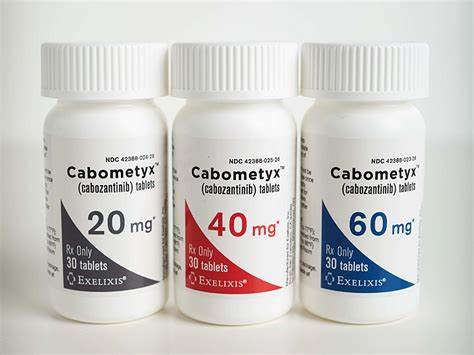Cabozantinib is a anticancer medication. It is used to treat cancers of the kidney and medullary thyroid that have spread to other regions of the body.
Indications of cabozantinib?
This drug is used to treat a variety of different forms of cancer (including kidney, thyroid, liver cancer). Cabozantinib is a member of the tyrosine kinase inhibitor class of medicines. It works by reducing or halting cancer cell proliferation.
Cabozantinib mechanism of action
Cabozantinib inhibits the tyrosine kinases of particular receptors, including VEGFR-1, -2, and -3, KIT, TRKB, FLT-3, AXL, RET, MET, and TIE-2.
Dosage
Cometriq
• 20mg
• 80mg
Cabometyx
• 20mg
• 40mg
• 60mg
- Medullary thyroid cancer – Only Cometriq. Indicated for the treatment of metastatic medullary thyroid carcinoma that has progressed (MTC)-140 mg PO 3 times a day. Continue until the condition progresses or an intolerable level of toxicity arises.
- Renal cell carcinoma – Only Cabometyx. When used in conjunction with nivolumab. In combination with nivolumab, it is indicated as a first-line treatment for advanced renal cell carcinoma (RCC). Cabozantinib 40 mg PO qDay in combination with nivolumab 240 mg IV every two weeks or 480 mg IV every four weeks. Continue until the condition progresses or the toxicity becomes intolerable. Only nivolumab: Continue for a maximum of two years
- Lone agent- Recommended for advanced RC. 60 mg PO once a day. Continue until the condition progresses or an intolerable level of toxicity arises.
- Hepatocellular carcinoma – Only Cabometyx. This medication is indicated for patients with hepatocellular carcinoma (HCC) who have previously received sorafenib treatment. 60 mg PO once a day. Continue until the condition progresses or an intolerable level of toxicity arises.
Administration
- Cabozantinib is a tablet that is taken orally.
- Cabozantinib should be taken on an empty stomach. Avoid eating for at least two hours prior to and one hour after taking cabozantinib.
- You should avoid grapefruit juice and eating grapefruit while taking cabozantinib. It may cause a change in the concentration of cabozantinib in your blood.
- Cabozantinib should be used exactly as prescribed.
- Capsules of cabozantinib should be swallowed whole with at least 8 ounces of water. Avoid crushing, dissolving, or opening capsules.
Cabozantinib side effects
Consult your physician immediately if any of the following adverse reactions occur:
- Blurred
- Sensations of burning, numbness, tingling, or discomfort
- Confusion
- Constipation
- Dark urine
- Skin darkening
- Reduced urination
- Diarrhea
- Breathing or swallowing difficulties
- Dizziness
- Fainting
- Experiencing a chill
- Hair thinning
- Headache
- Huskiness or hoarseness of voice
- Lightheadedness
- Appetite loss
- Depression
- Cramps, spasms, and stiffness of the muscles
- Vomit or nausea
- Nervousness
- Tinnitus
- Fast respiration
- Skin redness, swelling, or discomfort
- Skin scaling on the hands and feet
- Rash or sores on the skin
- Heartbeats that are slow or rapid
- Jaundice
Drug interaction
Cabozantinib may interact with any of the following:
- Abacavir
- Abiraterone
- Aliskiren
- Antiarrhythmic medications (e.g., amiodarone, disopyramide, dofetilide, dronedarone, procainamide, quinidine, sotalol)
- Apalutamide
- Apixaban
- Aprepitant
- Antifungal agents classified as “azoles” (e.g., itraconazole, ketoconazole, voriconazole)
- Contraception
- Calcium bisphosphonates (e.g., alendronate, etidronate, risedronate)
- Bosentan
- Calcium channel antagonists (e.g., amlodipine, diltiazem, nifedipine, verapamil)
- Cholestyramine
- Cobicistat
- Colchicine
- Conivaptan
- Deferasirox
- Digoxin
- Urinary diuretics (water pills; e.g., furosemide, hydrochlorothiazide, triamterene)
- Enzalutamide
- Fexofenadine
- Juice of grapefruit
- Inhibitors of hiv non-nucleoside reverse transcriptase (nnrtis; e.g., efavirenz, etravirine, nevirapine)
- Inhibitors of hiv protease (e.g., atazanavir, indinavir, ritonavir, saquinavir)
- Lamivudine
- Macrolide antibiotics (e.g., clarithromycin, erythromycin)
- Mifepristone
- Modafinil
- Additional kinase inhibitors (e.g., crizotinib, dabrafenib, dasatinib, idelalisib, imatinib, nilotinib, palbociclib)
- Rifabutin
- Rifampin
- John’s wort (hypericum perforatum)
- Sarilumab
- Saxagliptin
- Antiepileptic medicines (e.g., carbamazepine, phenytoin, phenobarbital, primidone)
- Sitagliptin
Precautions/ safety information
- Cabozantinib has been associated with severe and deadly hemorrhages. Cabozantinib-treated individuals in RCC and HCC studies experienced a 5% rate of Grade 3 to 5 hemorrhagic episodes.
- Cabozantinib should be discontinued in the event of Grade 3 or 4 bleeding. Cabozantinib should not be given to patients who have recently experienced hemorrhage, including hemoptysis, hematemesis, or melena.
- Fistulas And Perforations- Fistulas, including fatal ones, occurred in 1% of individuals treated with Cabozantinib. Perforations of the gastrointestinal (GI) tract, including fatal occurrences, occurred in 1% of Cabozantinib-treated patients.
- Patients should be observed for signs and symptoms of fistulas and perforations, such as abscess and sepsis. Cabozantinib should be discontinued in patients who have a Grade 4 fistula or GI perforation.
Storage
Maintain a temperature range of 68 to 77 degrees Fahrenheit, with excursions allowed to 59 to 86 degrees Fahrenheit.
Contraindications
- Thyroid hypothyroidism is a condition characterized by low thyroid hormone levels.
- Calcium deficiency in the blood.
- Reduced platelets in the blood.
- Low amounts of neutrophils, a type of white blood cell.
- Substantial uncontrolled hypertension.
Pregnancy or lactation
Cabozantinib has the potential to cause damage to an unborn child. Prevent pregnancy while taking this medication and for at least 4 months following your final dose. Inform your physician if you believe you may be pregnant. This medication may have an effect on both men’s and women’s fertility (ability to bear children).



